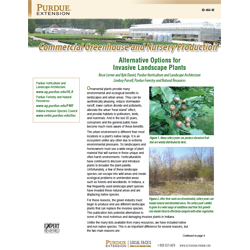 Purdue University - Extension - Forestry and Natural Resources
Purdue University - Extension - Forestry and Natural Resources
Got Nature? Blog
 Ornamental plants provide many environmental and ecological benefits to landscapes and urban areas. They can be aesthetically pleasing, reduce stormwater runoff, lower carbon dioxide and pollutants, alleviate the urban “heat island” effect and provide habitats to pollinators, birds and mammals. And in the last 20 years, consumers and the general public have become much more aware of these benefits. The urban environment is different than most locations in a plant’s native range. It is an ecosystem unlike any other due to extreme environmental pressures, so landscapers and homeowners must use a wide range of plant material that will survive in these unique and often harsh environments. Horticulturalists have continued to discover and introduce plants to broaden the plant palette. Unfortunately, a few of these landscape species can escape into wild areas and create ecological problems in unintended areas such as forests and woodlands. In Indiana, a few frequently used landscape plant species have invaded these natural areas and are displacing native species.
Ornamental plants provide many environmental and ecological benefits to landscapes and urban areas. They can be aesthetically pleasing, reduce stormwater runoff, lower carbon dioxide and pollutants, alleviate the urban “heat island” effect and provide habitats to pollinators, birds and mammals. And in the last 20 years, consumers and the general public have become much more aware of these benefits. The urban environment is different than most locations in a plant’s native range. It is an ecosystem unlike any other due to extreme environmental pressures, so landscapers and homeowners must use a wide range of plant material that will survive in these unique and often harsh environments. Horticulturalists have continued to discover and introduce plants to broaden the plant palette. Unfortunately, a few of these landscape species can escape into wild areas and create ecological problems in unintended areas such as forests and woodlands. In Indiana, a few frequently used landscape plant species have invaded these natural areas and are displacing native species.
For these reasons, the green industry must begin to produce and use different landscape plants that can replace the invasive species. This publication lists potential alternatives to some of the most notorious and damaging invasive plants in Indiana.
For a free download of the full publication, visit Commercial Greenhouse and Nursery Production: Alternative Options for Invasive Landscape Plants.
Resources
Native Trees of the Midwest, The Education Store
Shrubs and Woody Vines of Indiana and the Midwest: Identification, Wildlife Values, and Landscaping Use, The Education Store
FNR/Purdue Extension YouTube Video Playlist, Asian Bush Honeysuckle, Burning Bush and Multiflora Rose
Purdue Plant & Pest Diagnostic Laboratory (PPDL) (Send in samples or photos)
Lindsey Purcell, Chapter Executive Director/Certificate Liaison
Indiana Arborist Association
Rosie Lerner, Horticulturist
Retired

Recent Posts
- Report Spotted Lanternfly – Purdue Landscape Report
Posted: April 10, 2024 in Alert, Forestry, Invasive Insects, Plants, Wildlife, Woodlands - Declining Pines of the White Variety – Purdue Landscape Report
Posted: in Alert, Disease, Forestry, Plants, Wildlife, Woodlands - Are you seeing nests of our state endangered swan? – Wild Bulletin
Posted: April 9, 2024 in Alert, Forestry, How To, Wildlife - Cicadas in Spring! – Purdue Landscape Report
Posted: in Forestry, Plants, Safety, Wildlife - New Deer Impact Toolbox
Posted: April 7, 2024 in Forestry, Land Use, Plants, Publication, Safety, Wildlife, Woodlands - 2024-25 Fishing Guide now available – Wild Bulletin
Posted: April 4, 2024 in Alert, Aquaculture/Fish, Aquatic/Aquaculture Resources, How To, Ponds, Wildlife - Help Research Chronic Wasting Disease – Wild Bulletin
Posted: April 3, 2024 in Disease, Forestry, How To, Safety, Wildlife, Woodlands - Indiana Reptiles and Amphibians – IFWOA Webinar
Posted: April 1, 2024 in Forestry, How To, Webinar, Wildlife, Woodlands - Birding through the Seasons – IFWOA Webinar
Posted: in Forestry, How To, Webinar, Wildlife, Woodlands - Look Out for Invasive Carp in Your Bait Bucket – Wild Bulletin
Posted: March 31, 2024 in Alert, Aquaculture/Fish, Aquatic/Aquaculture Resources, Invasive Animal Species, Wildlife
Archives
Categories
- Alert
- Aquaculture/Fish
- Aquatic/Aquaculture Resources
- Ask the Expert
- Christmas Trees
- Community Development
- Disease
- Drought
- Forestry
- Forests and Street Trees
- Gardening
- Got Nature for Kids
- Great Lakes
- How To
- Invasive Animal Species
- Invasive Insects
- Invasive Plant Species
- Land Use
- Natural Resource Planning
- Nature of Teaching
- Plants
- Podcasts
- Ponds
- Publication
- Safety
- Timber Marketing
- Uncategorized
- Urban Forestry
- Webinar
- Wildlife
- Wood Products/Manufacturing
- Woodland Management Moment
- Woodlands